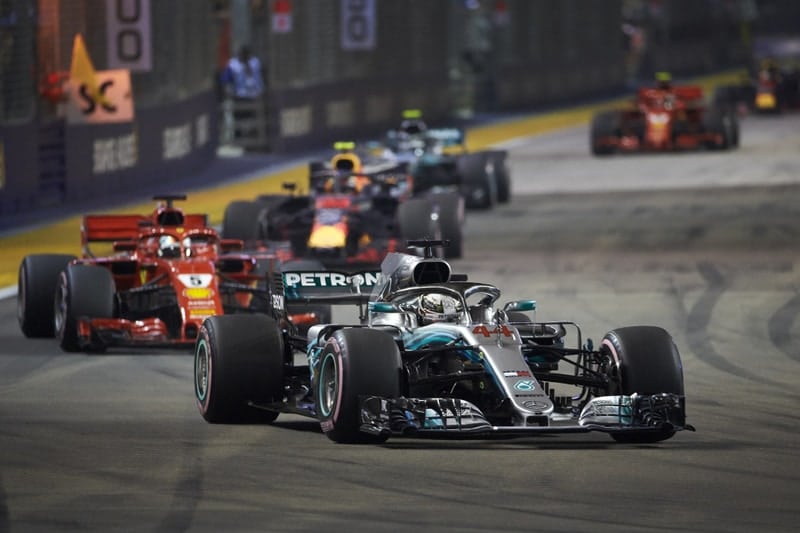
F1: Teams Consider Reverse Aero Allowance as No Budget Cap Agreed
On Thursday 16th April, the Formula One teams, FIA and F1 had their second meeting of the week in order to discuss plans for the remainder of the 2020 season as well as a potential budget cap.
For the second meeting in a row, the teams failed to agree upon a definative number, though it is believed that teams are positive over the idea of $130m.
The teams also discussed alternative methods to level the playing field, including setting a sliding reverse budget cap on aerodynamics. The proposal would give those at the bottom of the championship the largest cap to spend on aero, with the least allocated to the champions.
Aerodynamics is considered a major part of Formula One vehicle production. Mercedes, Ferrari and Red Bull all suggested this should be linked to the budget cap – allowing them to spend greater money in other areas, F1 bosses that proposal, but were happy with the idea of aerodynamic handicapping.
While counter-productive to competition, these aero caps would still allow manufacturers to spend greater amounts on their engine than the customer teams, who reduce their overall costs through engine deals. The fact some teams require a higher running cost was not lost upon Ferrari who pointed out during the meeting that customers (such as Haas and Alfa Romeo) spend less due to buying parts from the manufacturers and thus put less into research and development.
“When discussing a budget cap, we should not forget that we’ve got different situations, and it’s important that we find common ground somehow which is suited to the different situations. There is still analysis required to make the right decisions. I think we should avoid being really emotional at the moment.” – Mattia Binotto
During the week, Zak Brown (McLaren) had been vocal about the need for a single-tier budget cap, suggesting that up to 4 teams could drop out if it is not properly implemented.
“Given how long it takes to ramp up an F1 team, and given the economic and health crisis… to think there would be people lined up to take over those teams like there has historically been. I don’t think the timing could be worse from that standpoint.” – Zak Brown
A cap of $175 million has already been agreed, with an informal agreement for $150m on the table. Talks of it being reduced to $130m for 2022 have been opposed by Red Bull and Ferrari.
It is likely to take a few more weeks before an agreement can be made.
How much has Coronavirus had an impact?
Also discussed at the meeting was the future of the current season. As of the 17th April, thirteen races remain on the calendar, though government restrictions will almost certainly mean the rescheduling of the French and Belgium GP’s.
The FIA proposed starting the season in Austria before a double-header at Silverstone. A minimum of 8 races is required to make a championship season, though every reduced race can have a dramatic impact on the smaller teams.
Franz Tost, Alpha Tauri team principal, said that each race would cost between $1.5 and $2 million. A 12-race calendar (which is the most likely scenario) would cut 10 races and potentially up to $20 million. For the Italian outfit this would be 12% of their 2019 budget.
The push back to $150m is already a dramatic reduction upon the norm with five teams; McLaren, Renault, Red Bull, Mercedes and Ferrari spending upwards of that.
COVID-19’s effect on the world economy is nothing new as Formula 1 was forced to introduced severe cost reductions at the start of the decade due to the 2008 financial crash in which Honda, Toyota, BMW and Renault (as a manufacturer team) pulled out of the sport. The reductions allowed three privateer outfits to enter the sport, though all folded within 6 years due to spiralling costs.
It was this failure to introduce new blood in the past that Zak Brown was referencing with his threat of four teams pulling out. While F1 itself has enough capital to survive an abandoned season, as suggested by Max Mosley, time will tell whether the teams are equally prepared for the backlash come July.



![Private: [ID: 71rYi-xncgM] Youtube Automatic](https://motorradio-xijqc.projectbeta.co.uk/wp-content/uploads/2024/08/private-id-71ryi-xncgm-youtube-a-1-360x203.jpg)
![Private: [ID: 1SfHxvC8Doo] Youtube Automatic](https://motorradio-xijqc.projectbeta.co.uk/wp-content/uploads/2024/07/private-id-1sfhxvc8doo-youtube-a-1.jpg)
![Private: [ID: H6XRkf6kROQ] Youtube Automatic](https://motorradio-xijqc.projectbeta.co.uk/wp-content/uploads/2024/07/private-id-h6xrkf6kroq-youtube-a-1-360x203.jpg)
![Private: [ID: Kb6w-qAmKls] Youtube Automatic](https://motorradio-xijqc.projectbeta.co.uk/wp-content/uploads/2023/12/private-id-kb6w-qamkls-youtube-a-360x203.jpg)
![Private: [ID: CcpwYw20k3k] Youtube Automatic](https://motorradio-xijqc.projectbeta.co.uk/wp-content/uploads/2024/07/private-id-ccpwyw20k3k-youtube-a-360x203.jpg)

![[ID: x1SiRC5jhW4] Youtube Automatic](https://motorradio-xijqc.projectbeta.co.uk/wp-content/uploads/2022/04/id-x1sirc5jhw4-youtube-automatic-360x203.jpg)
![[ID: lMZ8lAeLubk] Youtube Automatic](https://motorradio-xijqc.projectbeta.co.uk/wp-content/uploads/2022/04/id-lmz8laelubk-youtube-automatic-360x203.jpg)
![[ID: GAYCcnqyFo4] Youtube Automatic](https://motorradio-xijqc.projectbeta.co.uk/wp-content/uploads/2022/04/id-gayccnqyfo4-youtube-automatic-360x203.jpg)
![[ID: Gg142H296QY] Youtube Automatic](https://motorradio-xijqc.projectbeta.co.uk/wp-content/uploads/2022/04/id-gg142h296qy-youtube-automatic-360x203.jpg)
![Private: [ID: 71rYi-xncgM] Youtube Automatic](https://motorradio-xijqc.projectbeta.co.uk/wp-content/uploads/2024/08/private-id-71ryi-xncgm-youtube-a-1-236x133.jpg)
![Private: [ID: H6XRkf6kROQ] Youtube Automatic](https://motorradio-xijqc.projectbeta.co.uk/wp-content/uploads/2024/07/private-id-h6xrkf6kroq-youtube-a-1-236x133.jpg)
![Private: [ID: Kb6w-qAmKls] Youtube Automatic](https://motorradio-xijqc.projectbeta.co.uk/wp-content/uploads/2023/12/private-id-kb6w-qamkls-youtube-a-236x133.jpg)
![Private: [ID: nc-8g6ROCe8] Youtube Automatic](https://motorradio-xijqc.projectbeta.co.uk/wp-content/uploads/2023/11/private-id-nc-8g6roce8-youtube-a-236x133.jpg)
![Private: [ID: wWrhfjOQuIc] Youtube Automatic](https://motorradio-xijqc.projectbeta.co.uk/wp-content/uploads/2023/11/private-id-wwrhfjoquic-youtube-a-236x133.jpg)